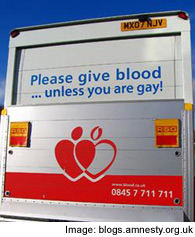British authorities are expected to lift a lifetime ban on homosexual men donating blood. Gay men will however only be permitted to donate if they have not had sexual intercourse for a decade, reported the UK Telegraph on April 10. Men who are or have recently been sexually active with other men will continue to be barred from giving blood.
The Telegraph reports: "The changes were instigated by Sabto, the advisory committee on the safety of blood, tissues and organs, which had concluded that if the ban were replaced by a new rule preventing gay men from giving blood for five years after having sex with another man, the risk of HIV reaching the blood supply would go up by less than 5%. It is estimated that this figure would halve if the “deferral” period were increased to 10 years, so ministers backed this option. The 10-year delay also ensures that people who are not aware they have contracted HIV do not pass it on accidentally."

The report says Anne Milton, the public health minister, is expected to announce the changes within weeks and she is understood to be backed by Andrew Lansley, the Health Secretary, and Lynne Featherstone, the Equalities Minister.
It also noted that the current system is based on trust as there are no checks to ensure donors are telling the truth about their sexuality. Some seven per cent of sexually active gay men are thought to give blood despite the ban.
The Department of Health has not yet commented.
Blanket ban since 1977
Many countries including US and Canada prohibit men who have had sex with other men even once since 1977 from donating blood. The blanket ban was first instituted in 1985 by the US Food and Drug Administration in response to the AIDS crisis, and later adopted by many countries worldwide. The 1985 provision argued that men who have sex with other men are at higher risk of contracting and transmitting HIV and hepatitis, posing a health risk to potential recipients. At the time, HIV testing was unavailable and little was known about HIV/AIDS.
Over the years, the F.D.A. has re-examined the ban at the insistence of lobby groups but maintains that the restriction is necessary to keep the blood supply safe and untainted by HIV. Today, donated blood is routinely screened for H.I.V. and other infectious agents. Advancements in HIV screenings now presents a window period of just 9-11 days using the newer but less common nucleic acid test (NAT) compared with using the common antibody test which has a window period of 2-8 weeks.
Critics say the ban is scientifically and medically unjustified and that it unfairly singles out gay men.
"The ban is also discriminatory in that it unfairly targets gay and bisexual men because it does not distinguish between high-risk and low-risk MSM, banning potential MSM donors who are HIV-negative and consistently practice safe sex or are in long-term monogamous relationships, while others with a significantly higher risk of HIV infection are subject to less restrictive deferrals or none at all." Wrote Adam Bink on Bilerico.com.
Italy and Spain do not mention MSM in their blood donor screening criteria while other countries have instituted a deferral period since last exposure: New Zealand (five years); Argentina, Australia, Brazil, Hungary, Japan (one year); and South Africa (six months).
